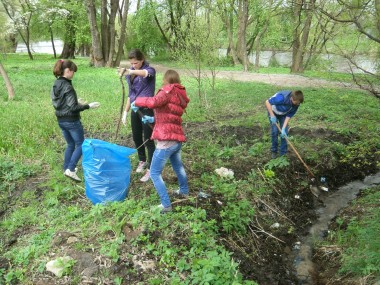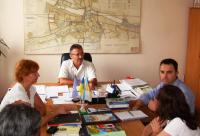Ukraine’s current administrative and territorial system is represented by 30 thousand local governments of different levels. In includes Autonomous Republic of Crimea, 24 regions, cities with special status Kyiv and Sevastopol', 498 rayons and 29815 settlements, including 454 urban communities. Quite often small territorial units (villages, settlements and even towns) are located at the territory of cities, or are so small, that they do not enough enough administrative and budgetary capacities for provision of quality and full-flegded services to their citizens.
Frequently municipalities face problems, resolution of which require joint efforts, notably those concerning solid waste management, cleaning of rivers and banks, forests, parks, development of common infrastructure for domestic and in-country tourism promotion and other. In these cases inter-municipal cooperation is strongly encouraged and even inevitable. Unfortunately, lack of knowledge, favorable legislation, government’s incentives and existing fiscal limitations prevent Ukrainian municipalities to apply this tool. During last years, the issue became on the agenda of the Government of Ukraine, which has taken a number of steps to encourage interregional cooperation for resolution of common municipal problems.
In Macedonian experience, as shared by the expert, inter-municipal cooperation is established for joint performance of functions under the competence of municipalities, performance of common functions and achievement of common interests and goals. For this, municipalities join financial, material and other resources.
The inter-municipal cooperation may be attained through:
a) establishment of bodies for inter-municipal cooperation
- common working body and commission, and
- common administrative body
b) establishment of common public services
- common public enterprise
- common public institution.
(2) The inter-municipal cooperation may also be attained through entering into contracts on:
- joining financial, material and other resources, and
- performing certain functions by one municipality on behalf of one or more other municipalities
Through introducing these forms of cooperation in Macedonia, 19 partnerships emerged uniting 49 municipalities which is almost half of all Macedonian municipalities (84 in total). (Read law "On Intermunicipal cooperation" of Macedonia).
Inter-municipal cooperation in Ukraine is very young, comparing to the European experience, which has proven success and value. In this case Ukraine is always eager to obtain and apply on practice latest approaches and recommendations. To this end Boran Ivanoski, Programme Manager of the UNDP Programme Inter-Municipal Cooperation for Better Service Provision and EU Accession paid a working visit to Ukraine on July 24th through July 30 to carry out the situational analysis and determine the areas for a potential intervention of UNDP to foster inter-municipal cooperation, focusing on recommendations of potential areas for UNDP development interventions needed to promote inter-municipal partnerships for improved public service delivery in Ukraine. Mr Ivanoski held a number of meetings with the UNDP Senior management, Municipal Governance and Sustainable Development Programme staff, Ministry of Regional Development, Construction,Housing and Municipal Economy of Ukraine and other governmental and non-governmental agencies to discuss and analyze the situation in Ukraine.
To get into details and study the current situation from the local self-government perspective, Mr Ivanoski travelled to Tulchyn, Vinnytsia region on July 27-28. There he met with representatives of local authorities and communities and discussed the problem of solid waste management and involvement of local population in solution of the problem. The participants of the meeting considered successful experience of Ivano-Frankivsk, aimed at promotion of separate collection of solid waste, which enables to cut number of digging pits, save energy resources, introduce culture of waste management and encourage recycling. The issue is also promoted by Ukrainian legislation. Notably, on May 25th 2011 the Cabinet of Ministers of Ukraine has approved a regulation on amendments to rules of solid waste collection services. Now the Ukrainian Municipalities are obliged to launch separate wastes collection on their territories.
Based on the collected and analyzed data and information Mr Ivanoski is supposed to draft a concept paper, containing practical recommendations to improve inter-municipal cooperation for better public service delivery, outline expected benefits and barriers in this field and propose it for the UNDP’s future interventions.
Mr Boran Ivanoski (Macedonian born) has a proven knowledge and experience in the Public Administration reform in Republic of Macedonia with emphasises on Local Self-government system. Five years of experience in set up legal and institutional environment of Inter-municipal cooperation in Macedonia. Six years of professional experience in Human Resources Management within Macedonian Civil Service and Western Balkan countries, with strong knowledge of establishment of training systems in local self government context. Practical experience in organisational development and conducting functional analysis, organisational design as well as job design in the Local-self Government Units. For the latest 7 years has been promoting public administration and inter-municipal cooperation in the UNDP.


















